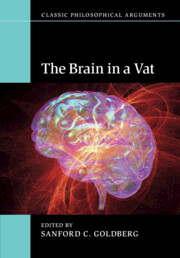Book contents
- Frontmatter
- Contents
- List of contributors
- Acknowledgments
- 1 Introduction: Putnam's reflections on the brain in a vat
- Part I Intentionality and the philosophy of mind and language
- 2 Putnam on brains in a vat
- 3 How to think about whether we are brains in vats
- 4 Brains in vats, causal constraints on reference and semantic externalism
- 5 Extended minds in vats
- Part II Epistemology
- Part III Metaphysics
- Bibliography
- Index
2 - Putnam on brains in a vat
from Part I - Intentionality and the philosophy of mind and language
Published online by Cambridge University Press: 05 June 2016
- Frontmatter
- Contents
- List of contributors
- Acknowledgments
- 1 Introduction: Putnam's reflections on the brain in a vat
- Part I Intentionality and the philosophy of mind and language
- 2 Putnam on brains in a vat
- 3 How to think about whether we are brains in vats
- 4 Brains in vats, causal constraints on reference and semantic externalism
- 5 Extended minds in vats
- Part II Epistemology
- Part III Metaphysics
- Bibliography
- Index
Summary
Skeptical hypotheses and the skeptical argument
The Cartesian skeptic puts forward various logically possible skeptical hypotheses for our consideration, such as that you are now merely dreaming that you are reading an entry on Hilary Putnam. The more radical Evil Genius hypothesis is this: you inhabit a world consisting of just you and a God-like Evil Genius bent on deceiving you. In the Evil Genius world, nothing physical exists, and all of your experiences are directly caused by the Evil Genius. So your experiences, which represent there to be an external world of physical objects (including your body), give rise to systematically mistaken beliefs about your world (such as that you are now sitting at a computer). Some philosophers would deny that the Evil Genius hypothesis is genuinely logically possible. Materialists who hold that the mind is a complex physical system deny that it is possible for there to be an Evil Genius world, since, on their view, your mind could not possibly exist in a matterless world. Accordingly, a modern skeptic will have us consider an updated skeptical hypothesis that is consistent with materialism. Consider the hypothesis that you are a disembodied brain floating in a vat of nutrient fluids. This brain is connected to a supercomputer whose program produces electrical impulses that stimulate the brain in just the way that normal brains are stimulated as a result of perceiving external objects in the normal way. (The movie The Matrix depicts embodied brains which are so stimulated, while their bodies float in vats.) If you are a brain in a vat, then you have experiences that are qualitatively indistinguishable from those of a normal perceiver. If you come to believe, on the basis of your computer-induced experiences, that you are looking at a tree, then you are sadly mistaken.
After having sketched this brain-in-a-vat hypothesis, the skeptic issues a challenge: can you rule out the possibility described in the hypothesis? Do you know that the hypothesis is false? The skeptic now argues as follows.
- Type
- Chapter
- Information
- The Brain in a Vat , pp. 19 - 26Publisher: Cambridge University PressPrint publication year: 2016

